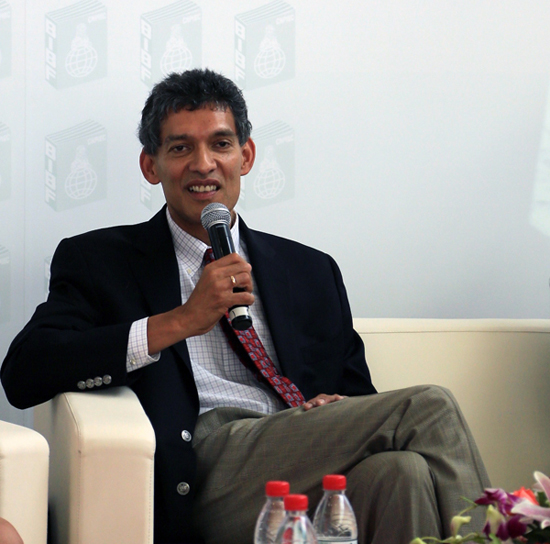Former IMF China chief: Forex policy change 'positive move'
- By Zhang Lulu
 0 Comment(s)
0 Comment(s) Print
Print E-mail China.org.cn, August 27, 2015
E-mail China.org.cn, August 27, 2015
|
Eswar S. Prasad, former head of the China division of the International Monetary Fund (IMF). [Photo by Zhang Lulu/China.org.cn] |
The change to China's foreign exchange rate formation system introduced by the Chinese central bank two weeks ago is a "positive move," said Eswar S. Prasad, former head of the China division of the International Monetary Fund (IMF) in Beijing Wednesday.
The People's Bank of China announced on Aug. 11 that the foreign exchange (forex) rate will take into account the closing inter-bank forex rate on the previous day, instead of relying solely on the central parity rate.
"What the Chinese central bank, the People's Bank of China, has done to allow the market to determine the exchange rate is a very positive move, because that reform allows the central bank to focus monetary policy on making the domestic economy better rather than managing the exchange rate. So in the long run it is a good reform although in the short term it may create more volatility," Prasad said during a launch meeting of the Chinese version of his latest book "The Dollar Trap: How the U.S. Dollar Tightened Its Grip on Global Finance."
Following the central bank's announcement, the yuan fell sharply by 1,136 basis points against the dollar, or 1.9 percent, to 6.2298 on Aug. 11. It witnessed further swings in the past two weeks and dipped to a record low of 6.4085 on Aug. 27, triggering concerns that the currency is going to weaken further.
The former IMF official and now professor at Cornell University argued that the RMB is likely to appreciate "in the long run (that is, beyond three to five years)" as the Chinese economy is still strong, but he said its trajectory in the next one to two years depends on government policies of opening up the capital account to make it easier for money to flow into and out of the country.
Extension of SDR basket
The IMF approved on Aug.11 the extension of the current Special Drawing Rights (SDR) valuation basket by nine months from Dec.31, 2015 to Sept.30, 2016, disappointing some in China who were hopeful for the yuan to be included into the currency basket this year.
This gives the RMB more time to meet all the conditions needed for being part of the SDR basket, Prasad said.
SDRs are international reserve assets defined by the IMF which can be drawn upon in times of need. Two criteria determine whether a currency can be part of the basket, namely, whether the issuing country is a major exporter and whether the currency is "freely usable." The basket is currently made up of the US dollars, British pounds, euros, and Japanese yen.
"China is undertaking all the reforms that are necessary for the RMB to be part of the SDR basket, although somewhat slowly." the former IMF China chief said, citing a number of positive measures taken by China, including freeing up the exchange rate and interest rates and freer flow of the RMB.
"I think that so long as China continues making progress in these areas, it will be difficult for the IMF to say that the RMB cannot be part of the SDR basket," he added.







Go to Forum >>0 Comment(s)